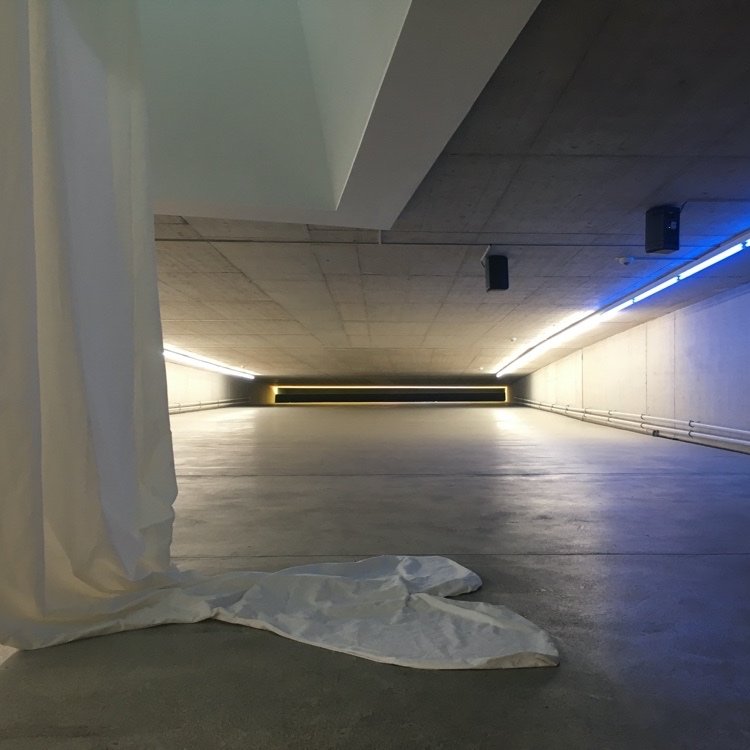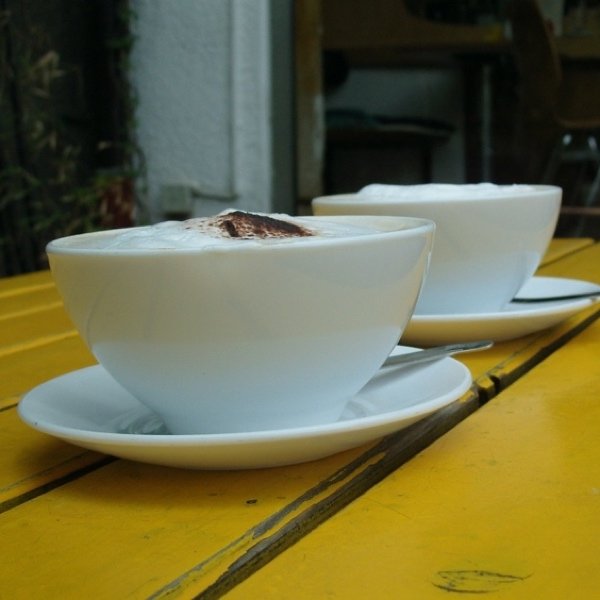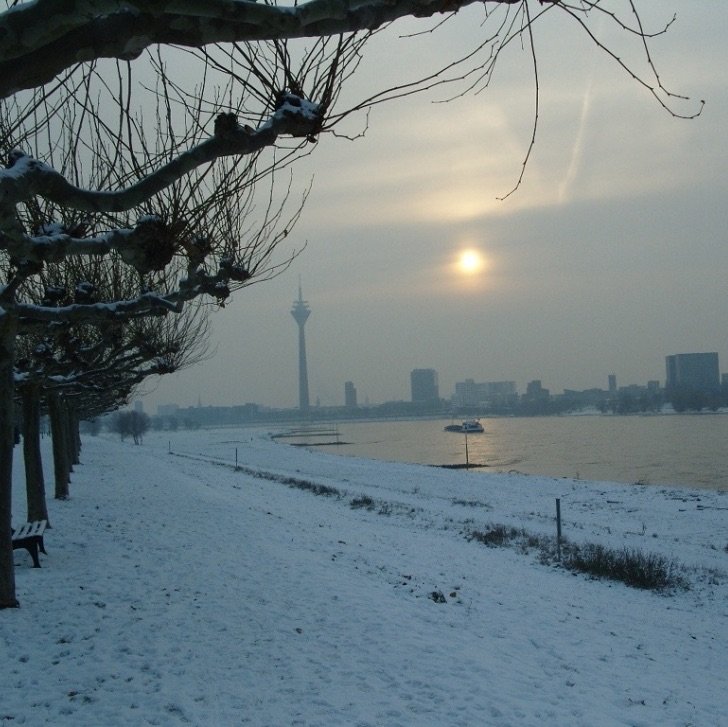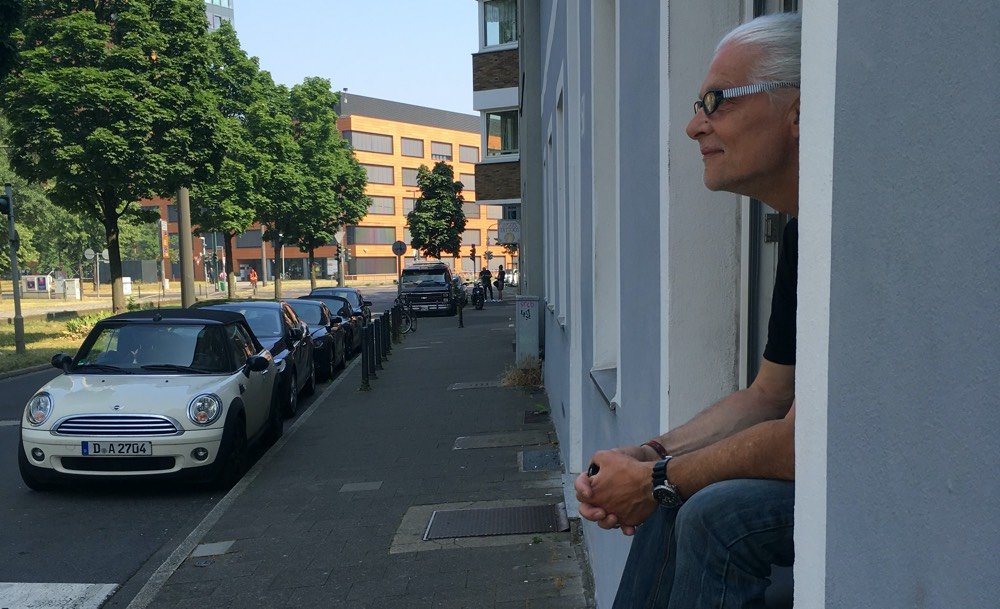Politics
ELECTIONS IN DÜSSELDORF
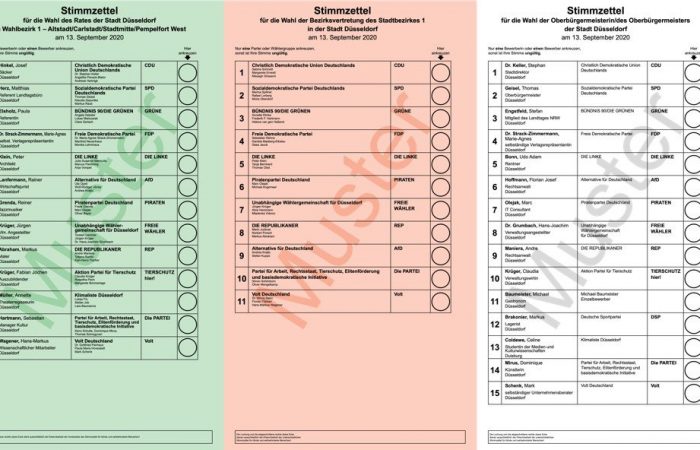
The municipal election, Kommunalwahl, is an opportunity for democracy on a local level to prove itself. It is the opportunity every five years for residents in Düsseldorf to vote for their choice of council representatives, Wahl des Rates, district representation, Bezirksvertretung. The Mayor, Oberbürgermeister or Mayoress, Oberbürgermeisterin, is up for election too.
Historical checks and balances also apply to these elections. Representatives are nominated by their party unless they are running independently and win through proportional selection according to party preferences. For the position of Lord Mayor or Lord Mayoress every vote placed for the candidate counts directly.
Universal suffrage includes many expats because under European Union law, voting in local elections is open to international residents who is a national from every EU country.
Depending on political leanings or topics concerning life choices a total of fifteen candidates have been approved to stand in 2020 to lead the city during the next five years, listed in order of the ballot and defined as shown. Information in German on the Düsseldorf website.
The Mayoral Candidates
Thomas Geisel, Sozialdemokratische Partei Deutschlands, SPD; Stephan Keller, Christlich Demokratische Union Deutschlands, CDU; Stefan Engstfeld, Bündnis 90/Die Grünen, Grüne; Marie Agnes Strack-Zimmermann, Freie Demokratische Partei, FDP; Udo Bonn, Die Linke; Florian Josef Hoffmann, Alternative für Deutschland, AfD; Marc Olejak, Piratenpartei Deutschland, Piraten; Hans-Joachim Grumbach, Unabhängige Wählergemeinschaft für Düsseldorf, Freie Wähler; Andre Maniera, Die Republikaner, REP; Claudia Krüger, Aktion Partei für Tierschutz, Tierschutz Hier!; Michael Baumeister, Einzelbewerber; Markus Brakonier, Deutsche Sportpartei, DSP; Celine Coldewe, Klimaliste Düsseldorf; Dominique Mirus, Partei für Arbeit, Rechtsstaat, Tierschutz, Elitenförderung und basisdemokratische Initiative, Die Partei, Mark Schenk, Volt Deutschland, Volt.
CDU is to the right aligned with right wing CSU in Bavaria, Grüne are the green party, FDP liberal, AfD right to far right, Piraten are against more than for, REP are somewhat xenophobic, Tierschütz are for animal rights, DSP for sport, Klimaliste for climate, Die Partei offers a package, Volt offers newer concepts.
Three have taken the time to respond to my questionnaire, and details can be read below in the order I received them.
Mark Schenk, Volt Deutschland, Volt
Regardless of their political leanings, why should expats vote in the upcoming election?
There are many topics regarding the upcoming election that have an influence on the life of Expats in Düsseldorf. As an expatriate, you belong to a very large community that should exert its influence on the fortune of the city – also with regard to future expats, whom we as a city absolutely want to win. So in terms of democracy, liberty and modernization you should vote. If you don ́t vote you are likely strengthening the extremist parties.
Do you consider the European or the local election to be of greater importance to expats in Düsseldorf? For what reasons?
I don’t think that one can say this election is more important than the other. You vote for different things and both elections are really important. In the local elections you vote for the surroundings that have an impact on your daily life. In the European elections you vote for many things that made it possible to work anywhere in the Union. That your health insurance is valid everywhere in the union when you are on vacation. If you don’t vote, the foes of Europe could take the lead. Having a look over the north sea shows us how fragile our freedom of work and travel is when the wrong people get elected.
There has been an ongoing debate over dedicated bicycle lanes in Düsseldorf over the years. Should there be more? Why is that? Exercise? Air quality? Noise pollution? Other? What is a possible long term goal?
If one looks at the ongoing changes in Cities like Paris, Kopenhagen, Hamburg Barcelona etc. there is a clear shift towards CO2 reduction and increase in air quality and city climate. Existing traffic areas are to be partially rededicated for pedestrians, greenery, cyclists, gastronomy. The longterm goal is a significant increase of quality of stay throughout the city of Düsseldorf.
Areas of pedestrianisation are noticeable in the city. Is there a policy to remove more vehicles from Düsseldorf? Could districts outside the city centre town experience reduced traffic too?
Definitely, we want to achieve a reduction of individual traffic in the city center. This will also reduce the need for parking strips, which can be used for other purposes. The same applies if public transport is adapted so that commuters are free to leave their cars at home.
Would the electrification of motor vehicles, motorcycles and mopeds be a priority for your city hall?
Electrification is only one building block on our agenda for traffic improvement: The main goal is to make the city center accessible for pedestrians, cyclers and all the small shops, cafes, bars and parks that everyone around the world loves about liveable urban areas. Yes, it’s better to have electrified vehicles in town temporarily because of their (non)emissions, but No, we don’t want to make it a habit to support individual transport. Intelligent, ecological, compatible, affordable public transport is the key to the future.
Tourism is an important topic for locations everywhere. Do you consider AirBnB good for the city of Düsseldorf or is it a problematic issue? Or both?
It’s a problematic issue regarding affordable housing in Düsseldorf. Our Hotels are at a capacity of only 70% and these numbers are before COVID19 hit the country. There is a lot more room for Tourists from all over the world, but there is not enough affordable housing in Düsseldorf right now. So the focus has to be to provide flats for families not weekend apartments for tourists.
Stores and gastronomy require footfall. Does there need to be a campaign for Düsseldorf? Will this continue in the foreseeable future? Is the city becoming more varied or more monotone?
One major political goal of Volt is the development of a lively city center for the citizens instead of cars. We want to make way for a multi modal traffic system to exclude cars from the center as much as possible while supporting both technically and socially accessible concepts, e.g. by supporting the 1€ per day ticket for public transport.
Expats continue to relocate to the city of Düsseldorf. In what ways does this benefit the city?
Volt is the party that welcomes diversity by origin at the heart of their values. We firmly believe in the positivity that stems from a diverse society, and Europe is and has always been a continent with many neighbors, languages and heritage. We therefore embrace the idea of expatriation very much and welcome new members of the Düsseldorf citizens!
Do you believe that national residents in Düsseldorf will continue to be so welcoming to foreigners when numbers continue to rise?
We see all expatriates as ambassadors of other countries and cultures from which we can and must learn. The world has become global, and so have the demands of the people who live in the cities – even in Düsseldorf. We want to attract expatriates so that they feel comfortable during their stay and ultimately offer them the opportunity to express themselves positively about our city. We want to encourage the local economy to grow here in Düsseldorf and attract new companies to come to us or to set up here – because we are an internationally attractive location for international employees and will become even better from here. It’s our firm belief that Düsseldorf is and will be a city that celebrates its diverse citizenship. For example, the Düsseldorfers are very proud that they included a pretty large population of Japanese citizens who contribute a lot to the international flair we all love about the city.
Is reducing debt (beyond emergency Covid requirements) or attaining a balanced bud- get an important future policy for you in Düsseldorf?
Right now we have to invest to make reducing debts possible in the future. We need a stronger and more sustainable economy in our city to reach a balanced budget while investing in the city to keep it as attractive as it is right now.
If voters elect you to office on Sunday, could you say which would be the three most important goals for you to achieve as soon as possible?
Goal number 1 is a coordinated master plan for the general traffic redesign in Düsseldorf. The first single measure is the reduction of the price of the public transport ticket. The second goal is the establishment of a Clean-tech hub that promotes innovations in CO2-reducing technologies. Companies in Düsseldorf are to be encouraged to develop our city into a leading business location worldwide. Furthermore, English-speaking staff at our city’s welcome desks will ensure that expatriates can quickly feel at home with us. Digital services on our municipal website will also be significantly improved.
Dr Marie Agnes Strack-Zimmermann MdB, Freie Demokratische Partei, FDP
Regardless of their political leanings, why should expats vote in the upcoming election?
Your voices count – and voting is the best way to make your voice heard. We are very fortunate to be living in a democracy where we can vote those people into office that represent our views best, and vote those out of office that do not represent our views. In the end, voting gives everyone the opportunity to create the community they want to live in.
Do you consider the European or the local election to be of greater importance to expats in Düsseldorf? For what reasons?
I would argue that local elections are probably most important because they have the most direct impact on a person’s life. In local elections, people decide how they want national or international law implemented in their communities. This, in turn, obviously means that national and supranational elections set the broader legal framework. So, every election is really important.
There has been an ongoing debate over dedicated bicycle lanes in Düsseldorf over the years. Should there be more? Why is that? Exercise? Air quality? Noise pollution? Other? What is a possible long term goal?
We want to invest in better cycling infrastructure. We advocate for a need-based extension of dedicated bicycle lanes. Especially in the city center, bicycle lanes should be uninterrupted. All surrounding neighborhoods should be connected to the city center by a well thought-out cycle path network. Where it is possible, we want to install visibly separated bicycle lanes. We want to make bicycling safer and more convenient in the whole city, so that it will become a normal part of people’s life. Our goal is to increase bike traffic and reduce car traffic. Increasing bike traffic is important if we want to make traffic greener. If more people use their bikes to go to work or run errands, it means less cars on the streets, less traffic and congestion, less CO2 emissions and better air quality. That said, we do not want to pit one means of transportation against the other. Rather, we want to offer good alternatives for everyone.
Areas of pedestrianisation are noticeable in the city. Is there a policy to remove more vehicles from Düsseldorf? Could districts outside the city centre town experience reduced traffic too?
Approximately 250,000 people commute into the city every (work-)day. Of those only 50,000 use public transportation. 200,000 commute into the city by car. If we want to reduce traffic, we will have to offer better and more convenient alternatives for those who commute into the city by car. For example, parking plays a crucial part in managing the amount of traffic and congestion on the city’s streets. We propose to develop more Park and Ride car parks around the periphery of the city to provide for long stay and commuter parking with a transport link that offers a fast connection into the city center. This will reduce the number of cars entering the city during the morning peak hours. Our long-term goal is to improve the city’s public transportation to make it easier and more comfortable to get around in the whole city, so that ultimately more people will be encouraged to switch from their private vehicle to public transport.
Would the electrification of motor vehicles, motorcycles and mopeds be a priority for your city hall?
New types of driving can grant us individual mobility but at the same time help us reduce CO2 emissions. We want to explore all alternative forms of energy in an open and unbiased way. We want to find the best possible solution for Düsseldorf. That said, we do support the expansion of public charging points for electric cars and hydrogen-powered cars. We believe in leading by example; therefore, we want the municipal car pool to be carbon-neutral within the next ten years.
Tourism is an important topic for locations everywhere. Do you consider AirBnB good for the city of Düsseldorf or is it a problematic issue? Or both?
Airbnb only becomes a problem when the city loses housing space because of it. We already have a shortage of affordable living space; Airbnb can add to the pressure on the market. Airbnb hosts (investors) who buy up whole apartment buildings and rent them out year round, should therefore be treated as hoteliers and their rentals regulated as hotels. Individual hosts who rent out rooms in their apartments for a few days a year, for example to fair visitors, should be able to continue to do that.
Stores and gastronomy require footfall. Does there need to be a campaign for Düsseldorf? Will this continue in the foreseeable future? Is the city becoming more varied or more monotone?
Düsseldorf already has a lot of variety to offer and this will not change anytime soon. The city is well- known beyond its borders for its diverse eating and shopping experience. I think that locals and visitors alike appreciate this diversity already very much.
Expats continue to relocate to the city of Düsseldorf. In what ways does this benefit the city?
People relocate to Düsseldorf from all over the world. Almost all UN nations are represented among the residents of the city. Düsseldorf is a truly cosmopolitan city. The city’s culture has been shaped by immigrants and it will continue to be shaped by them. No matter how long they stay – if only for a limited period of time or if they relocate to Düsseldorf permanently – immigrants make Düsseldorf more diverse and innovative. They help Düsseldorf gain international recognition. Immigrants also benefit the city financially because they bring their business with them.
Do you believe that national residents in Düsseldorf will continue to be so welcoming to foreigners when numbers continue to rise?
Yes, I do believe that the residents of Düsseldorf will continue to be so welcoming to foreigners even when numbers are continuing to rise. Düsseldorf is an open and diverse city that welcomes everyone. It is in the city’s nature. We do not care about ethnicity, sexuality, religion or a disability. Everyone gets their chance here, be able to dream and fulfil their dreams. We oppose every form of racism, extremism, homophobia or antisemitism. However, a free and open community can only exist and function well if every individual accepts the freedom of the other and grants it equal rights. We will object anyone who thinks differently, no matter what ethnic or cultural background. The German Grundgesetz serves as our guide for living together.
Is reducing debt (beyond emergency Covid requirements) or attaining a balanced bud- get an important future policy for you in Düsseldorf?
The city must stay debt-free, in order to be able to invest further into the future. We stick to our principles: we would rather invest in kindergartens, schools, culture and welfare than to pay interest to banks. The ramifications of the Corona pandemic present challenges of a historic dimension. Since the end of World War II there has not been such a massive slump in economic performance with such dramatic consequences. On the one hand, we face an all-time high of short-time work programs and a rising unemployment rate that have created a massive financial burden for the state. On the other hand, the state records less tax revenue. We recognize the need for taking on new debts at this critical time as a crisis management measure to relieve acute financial distress. However, we want these debts to be payed off within ten years from now. From 2022 onwards, the city’s budget should not include any new debts.
If voters elect you to office on Sunday, could you say which would be the three most important goals for you to achieve as soon as possible?
The three projects that are probably most important to me are a housing program worth 100 million euros that is intended to take pressure off the exploding housing market, the extension of the Rhine promenade below the Ehrenhof and exploring the possibility of developing more Park and Ride car parks around the periphery of the city to provide for long stay and commuter parking.
Stefan Engstfeld, Bündnis 90/Die Grünen, Grüne
Regardless of their political leanings, why should expats vote in the upcoming election?
It’s simple: your city your choices. Many local political decisions are relevant to local life! Especially if you live here in Düsseldorf for a longer period of time and families move to the city. Please also read Giol and 10 points for more green reasons, why expats should vote on Sunday.
Do you consider the European or the local election to be of greater importance to expats in Düsseldorf? For what reasons?
Every Election is important! The political fields and their effects, however, differ of course – especially how many people are affected by each of them. As you might know, Stefan was the European policy spokesman of the Green Party in the NRW state parliament for many years – and is a convinced European. He also is the chairman of the Brexit Commission, which is investigating the effects of Brexit on NRW. So even if he runs for office in this election it is hard to define one election as ore important than another one.
There has been an ongoing debate over dedicated bicycle lanes in Düsseldorf over the years. Should there be more? Why is that? Exercise? Air quality? Noise pollution? Other? What is a possible long term goal?
Areas of pedestrianisation are noticeable in the city. Is there a policy to remove more vehicles from Düsseldorf? Could districts outside the city centre town experience reduced traffic too?
Would the electrification of motor vehicles, motorcycles and mopeds be a priority for your city hall?
Yes there should be more for all of the reasons you stated above. I’m also adding climate protection and security. I,Nils Kleibrink, Campaign Manager will summarise your questions 3, 4 and 5 regarding future mobility:
Stefan’s goal is a city for people and their mobility, not for cars. As Lord Mayor, Stefan will strengthen the alternatives to the car in such a way that many people in Düsseldorf want to and can do without it. In the end, everyone will benefit from this – even those who still find it impossible to do without a car.
- Secured, fast and comfortable cycle paths and express routes for a continuous cycle network connecting all city districts, as well as fast cycle paths into the surrounding area, quickly implemented by a new urban cycle company (“RadBau”)
- Construction of bicycle parking garages, at least 10,000 spaces are needed at the main station alone
- More space for pedestrians* and the creation of ten green lifelines by 2025, i.e. car-free, greened streets that offer space for recreation, games and gastronomy
- Better connections with the Rheinbahn, a 10-minute interval on all lines from 6-24 o’clock (also on weekends), on the main lines even a 7.5-minute interval
- Complete conversion of the Rheinbahn to climate-friendly drive systems such as electric and hydrogen
- When they deregister their car, citizens* receive a free ticket for public transport for five years
Tourism is an important topic for locations everywhere. Do you consider AirBnB good for the city of Düsseldorf or is it a problematic issue? Or both?
The situation on the residential market in the state capital of Düsseldorf remains clearly tense. There is an urgent need for action, particularly in the case of commercial short-term rentals, as there is a discernible trend towards the permanent withdrawal of rental apartments and price increases. For the Green Council Fraction, it is important to establish a suitable instrument to prevent apartments from being permanently withdrawn from the housing market.
Stores and gastronomy require footfall. Does there need to be a campaign for Düsseldorf? Will this continue in the foreseeable future? Is the city becoming more varied or more monotone?
Quarters are changing: where retail is located, the pressure from online trading / digitalisation is most noticeable in the vacancy rate in the neighbourhood. Supermarkets, bank branches and church institutions are closing. Many people who want to change their living situation have to leave their neighbourhoods, whether they want to or not. The reasons are gentrification and a lack of suitable and affordable housing – especially for older people and families. It is not uncommon for neighbourhoods to be divided by very different, very homogeneous building styles – single-family homes on the one hand, high-rise buildings on the other – de facto by their respective milieu composition. All this weakens neighbourhoods and social cohesion in the neighbourhood and thus also in Düsseldorf as a whole.
We Greens want to further strengthen the neighbourhood. Because here Düsseldorf is a village and a big city in one. Children go to school in the neighbourhood, errands are run and sports are played in the neighbourhood. Everyday life takes place in the neighbourhood. Especially for people who are less mobile, it is important that the neighbourhood continues to have much to offer. Children experience independence and multicultural normality in the neighbourhood and are therefore ‘big city kids’ and children of their neighbourhood. Elderly people maintain contacts, especially in the neighbourhood, and people with physical disabilities are happy with short distances. All people benefit from a local supply of pharmacies, doctors* and retail outlets.
Expats continue to relocate to the city of Düsseldorf. In what ways does this benefit the city?
Stefan will work to further internationalise Düsseldorf. As Greens, we have always called for this in recent years and have also supported all the efforts of the administration in this direction, including the promotion of foreign language skills in the administration and a multilingual website to make the stay in Düsseldorf as pleasant as possible for new citizens who do not speak German very well. I am firmly convinced that the expats living here not only help to make the city more attractive for companies to settle here, but also help the people who live here to gain a new, more urban and open perspective on other life plans and goals in their dealings with other cultures.
Do you believe that national residents in Düsseldorf will continue to be so welcoming to foreigners when numbers continue to rise?
Düsseldorf is an open city where newcomers quickly settle in and feel at home even after a short time. This is especially true for those who have fled, for whom Düsseldorf has always been prepared to accept additional contingents. Even if there are isolated voices from xenophobic camps, we can state that the vast majority of citizens are firmly opposed to such views. But that does not mean we must be careless. On the contrary: we will monitor developments closely and react immediately and decisively, should the need arise.
Is reducing debt (beyond emergency Covid requirements) or attaining a balanced bud- get an important future policy for you in Düsseldorf?
Presenting a balanced budget is of course an important goal for us. But in times of Corona we have to help the economy even if it means to raise credits.
If voters elect you to office on Sunday, could you say which would be the three most important goals for you to achieve as soon as possible?
- Making Düsseldorf the climate capital of Düsseldorf. Because we are the first generation to feel the effects of climate change and the last to stop the climate crisis. We must implement the climate targets set in Paris. As Lord Mayor, Stefan will do everything to make Düsseldorf climate neutral by 2035 at the latest.
- Future mobility is the second important topic. Stefans goal is a city for people and their mobility, not for cars. As Lord Mayor, Stefan will strengthen the alternatives to owning a car in such a way that many people in Düsseldorf want to and can do without it. In the end, everyone will benefit from this – even those who still find it impossible to do without a car.
- Housing is the third important topic. Stefan would like to have a Düsseldorf where everyone can find a flat, regardless of their wallet. To achieve this goal, we will use a wide range of management instruments. Because one thing is clear: housing is a human right!
Is there any unstated question you would like to address?
We know that Düsseldorf is a popular and liveable city a sustainable business location – even for international expats. But we have to make progress with digitalisation and as a climate capital. We believe that we as the administration and in the offices can make better offers (also multilingual) for you than our neighbours and colleagues. In addition to the already existing Expat Service Desk. There is air up there when you look at the other metropolises in the world and when you follow your Facebook groups – so many questions and uncertainties. Therefore: Qualified professionals / expats and international companies are of elementary importance for the future of our city – from nursing care to IT, from municipal administration to day-care centres. Together with the chambers, associations and trade unions, we want to create the right framework conditions in Düsseldorf. By further improving coordination with the job centre, the chambers and the municipal offices, we are enabling more qualified migrants to enter the labour market and start their own businesses as easily as possible.
By Vincent Green / Sep 10/12 2020
Der Bundeswahlleiter, Statistisches Bundesamt
Gustav-Stresemann-Ring 11
65189 Wiesbaden
+49 611 754 863
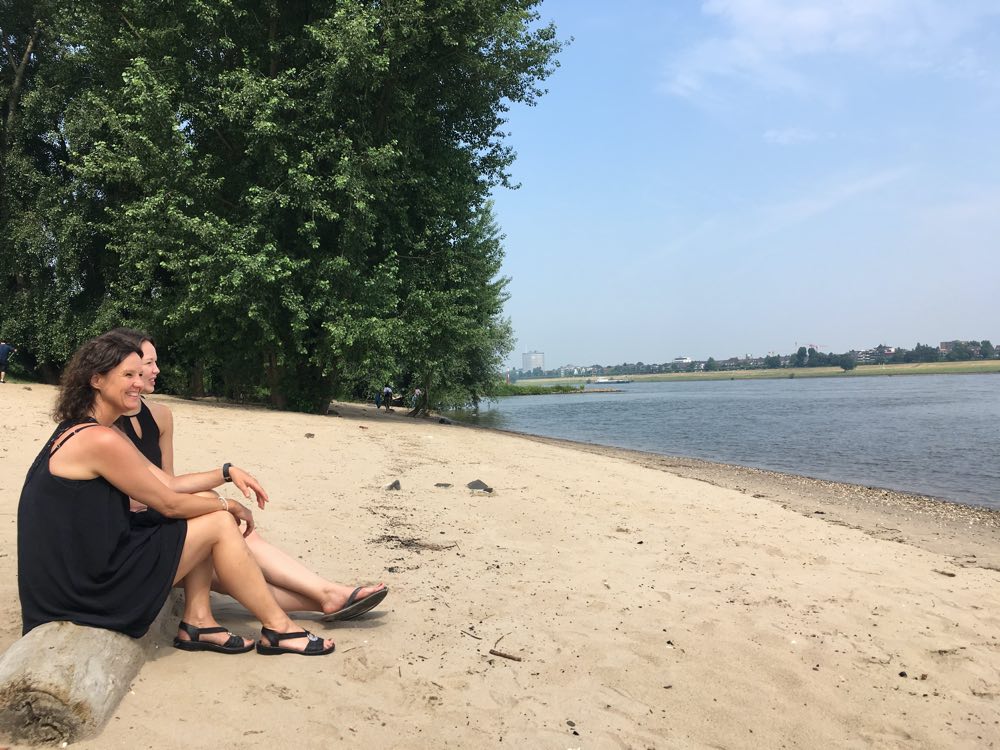
BEACHES IN DÜSSELDORF
To the surprise of newly arrived expats, some sections of the Rhine in Düsseldorf offer numerous beaches on both banks. The fine sand and shingle are ideal for walking, playing, relaxing and picnicking. Especially on warm and sunny summer days, people flock to enjoy the river.

MOVIES IN DÜSSELDORF
Original language movies are popular among expats in Düsseldorf. Films are frequently screened in English at a variety of cinemas in original with subtitles, known as OmU or Original mit Untertitel and without, portrayed as OV or Original Version.
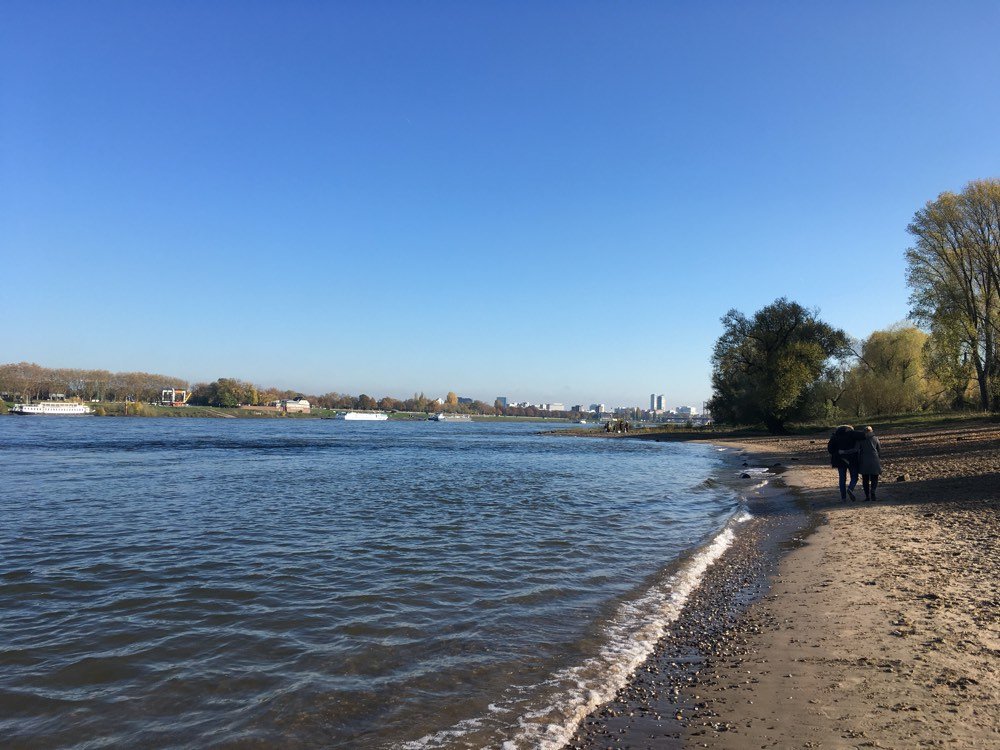
WALKING IN DÜSSELDORF
A great way to get to know Düsseldorf is to take an inspiring and rewarding walk, allow impressions to cause a pause, interact and allow details to remain more memorable. Admiring quaint side streets, strolling the promenade, the riverside or numerous woodlands bring joy to the soul.
Society & Folk
Society and folk in Germany is often hotly debated and opinions divided. However, anyone who has experienced the hospitality offered in this culture knows more. Germans are more laid back than first meets the eye. Life in Germany as a whole and Düsseldorf especially is peaceful.

